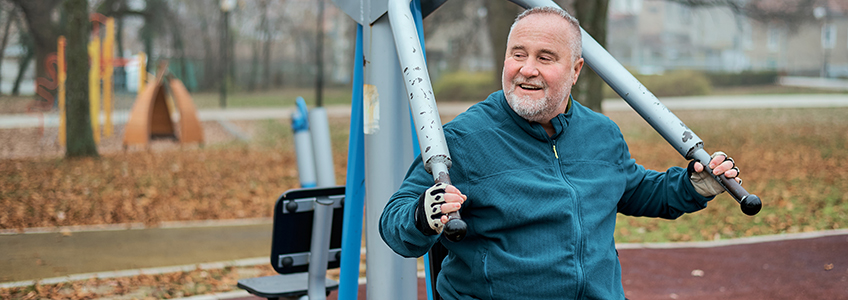Dr. Alvaro Velarde, researcher and coordinator of the Sports Area of the Fundación Universitaria Iberoamericana (Iberoamerican University Foundation, FUNIBER), participates in a study that analyzes the effects of a multicomponent physical exercise program on the functional fitness of a group of overweight or obese older adults in Chile.
Physical fitness is an important component in the quality of life, physical independence and health status of older adults. It is also known as functional fitness and encompasses factors such as aerobic endurance, strength, balance, both dynamic and static, and flexibility, which are key for this population group in performing their daily activities safely and without excessive physical fatigue.
Aging is associated with decreased physical functioning and leads to a high level of dependency in older adults due to decreased physical capabilities. Therefore, optimizing their functional fitness will allow them to preserve their physical independence and, consequently, improve their quality of life.
Several recommendations have proposed the inclusion of physical activity as a way to improve functional fitness through exercise. These recommendations have focused on improving aerobic capacity, strength training, balance and mobility, with the aim of improving physical function and preventing falls, cognitive impairment and disease in older adults. Scientific evidence has shown that different types of physical exercise can be implemented, such as resistance training, combined training, aerobic exercise training or high-intensity intervallic training. However, there is little evidence on the use of the Senior Fitness Test and multicomponent physical exercise to assess functional fitness in older adults. Therefore, there are no concrete protocols combining aerobic and resistance exercises of greater homogeneity in data collection instruments.
To resolve the above, a study was conducted to analyze the effect of a multicomponent physical exercise program (comprising strength, endurance, balance, gait and physical function training) on the functional fitness of overweight or obese older adults aged 60 to 86 years in Chile. For this purpose, the participants were divided into two groups, one control and one experimental. The program consisted of two 60-minute sessions each week for six months.
The results indicated that the program had beneficial effects on the functional fitness of the participants. Before the intervention, there were no significant differences in any of the components (aerobic endurance, upper body strength, flexibility, balance, etc.) of physical fitness between the groups, except for right hand pressing strength where the control group showed better results.
After the intervention, significant improvements in functional fitness were observed in the participants of the experimental group. For example, in the 6-minute walking test, members of the experimental group were able to walk faster and cover a greater distance in the same period of time compared to the control group. In addition, improvements in upper body strength and lower body flexibility were found in the experimental group.
However, no significant differences were found in dynamic balance and left and right hand pressing strength after the intervention. These results could be related to the lack of previous physical activity in both groups before the intervention. On the other hand, in the control group, scores remained similar or worsened after the program.
It is important to note that this study has some limitations. On the one hand, the sample size was limited and the selection of participants was done by convenience, which may affect the generalizability of the results. In addition, long-term follow-up was not performed to assess whether the effects of the physical exercise program were maintained over time. Nevertheless, the study has shown that a multicomponent physical exercise program is a good strategy to improve the quality of life of older adults with overweight or obesity problems.
If you want to know more about this study, click here.
To read more research, consult the UNEATLANTICO repository.
The Iberoamerican University Foundation (FUNIBER) promotes several study programs in the area of sports, such as the Master’s Degree in Nutrition, Physical Activity and Sports. This program is aimed at professionals with an interest in physical activity and nutrition for health promotion and nutrition and sport for performance. This is your opportunity to take your career to the next level and become an expert in the field of health and sport.
